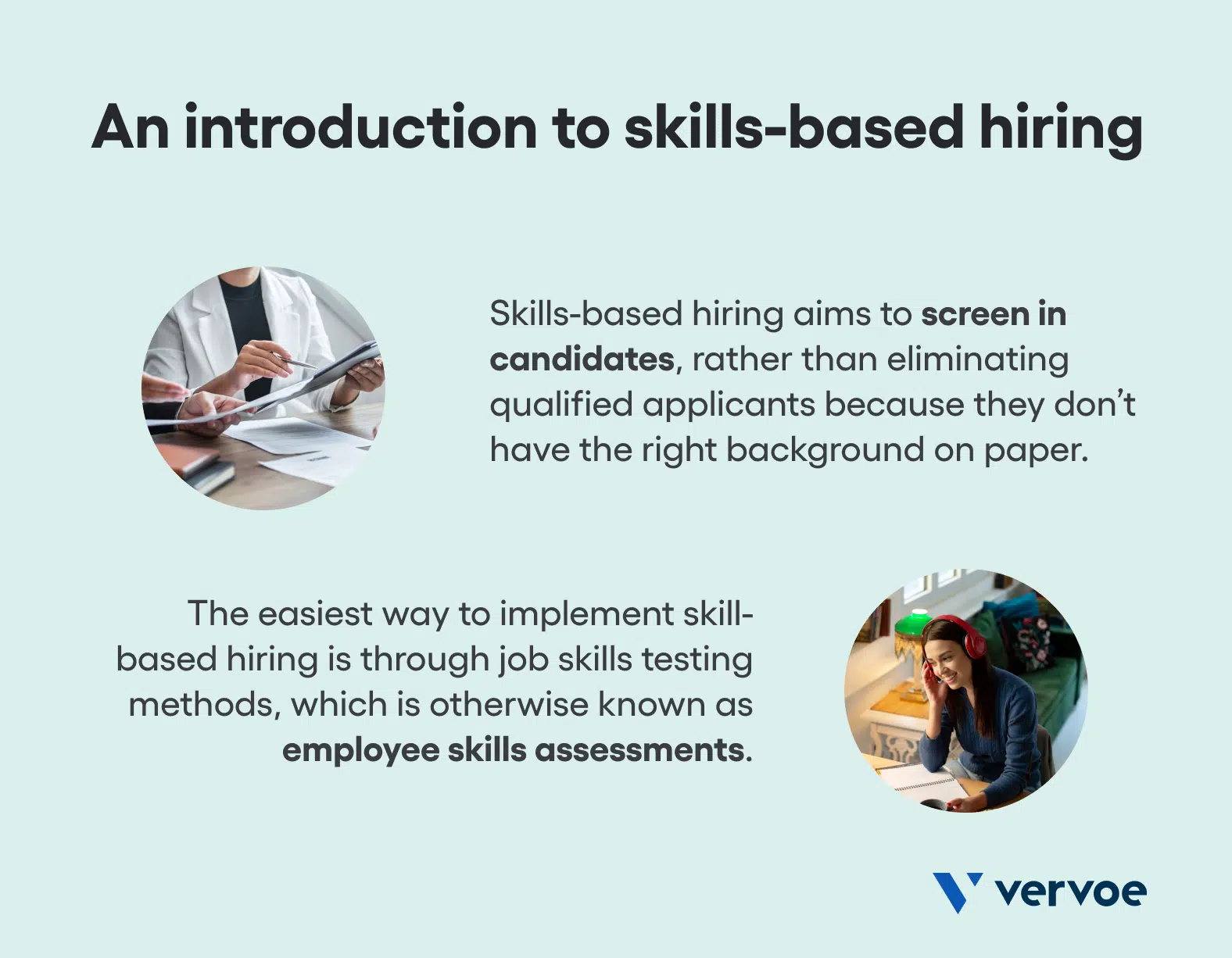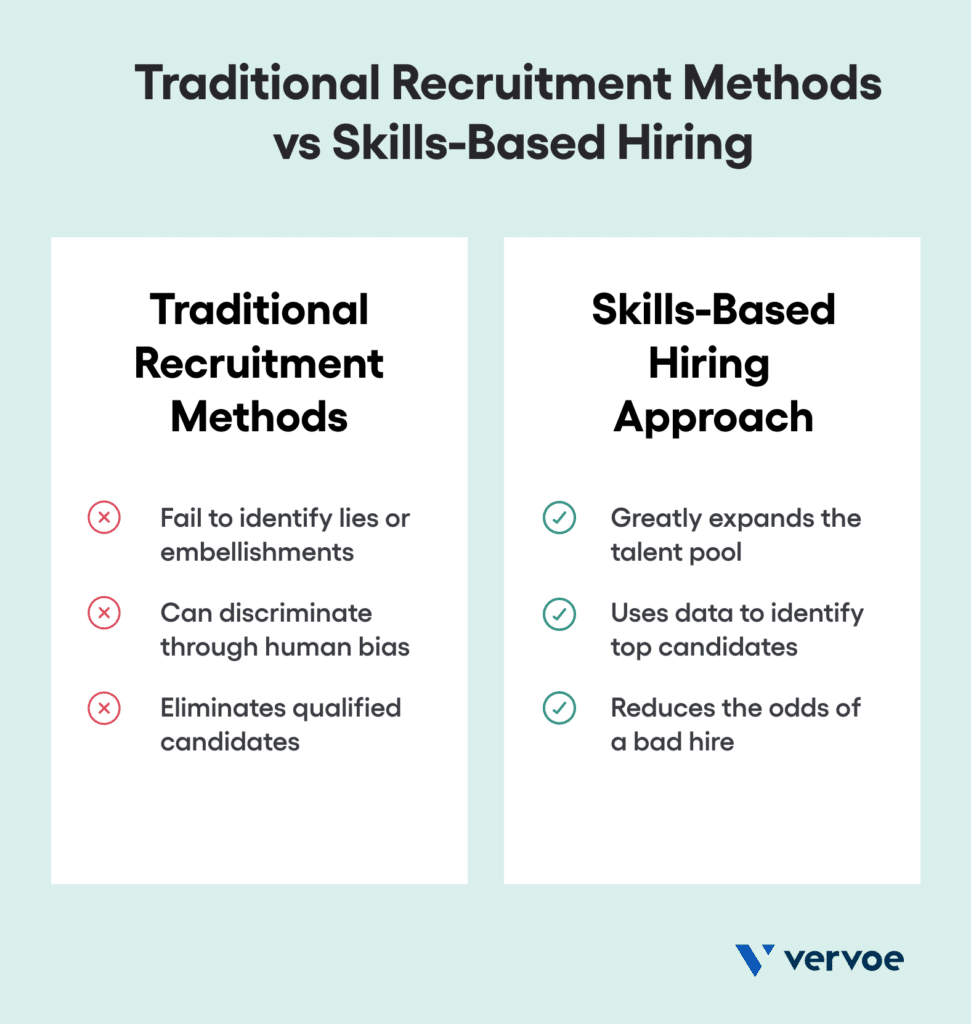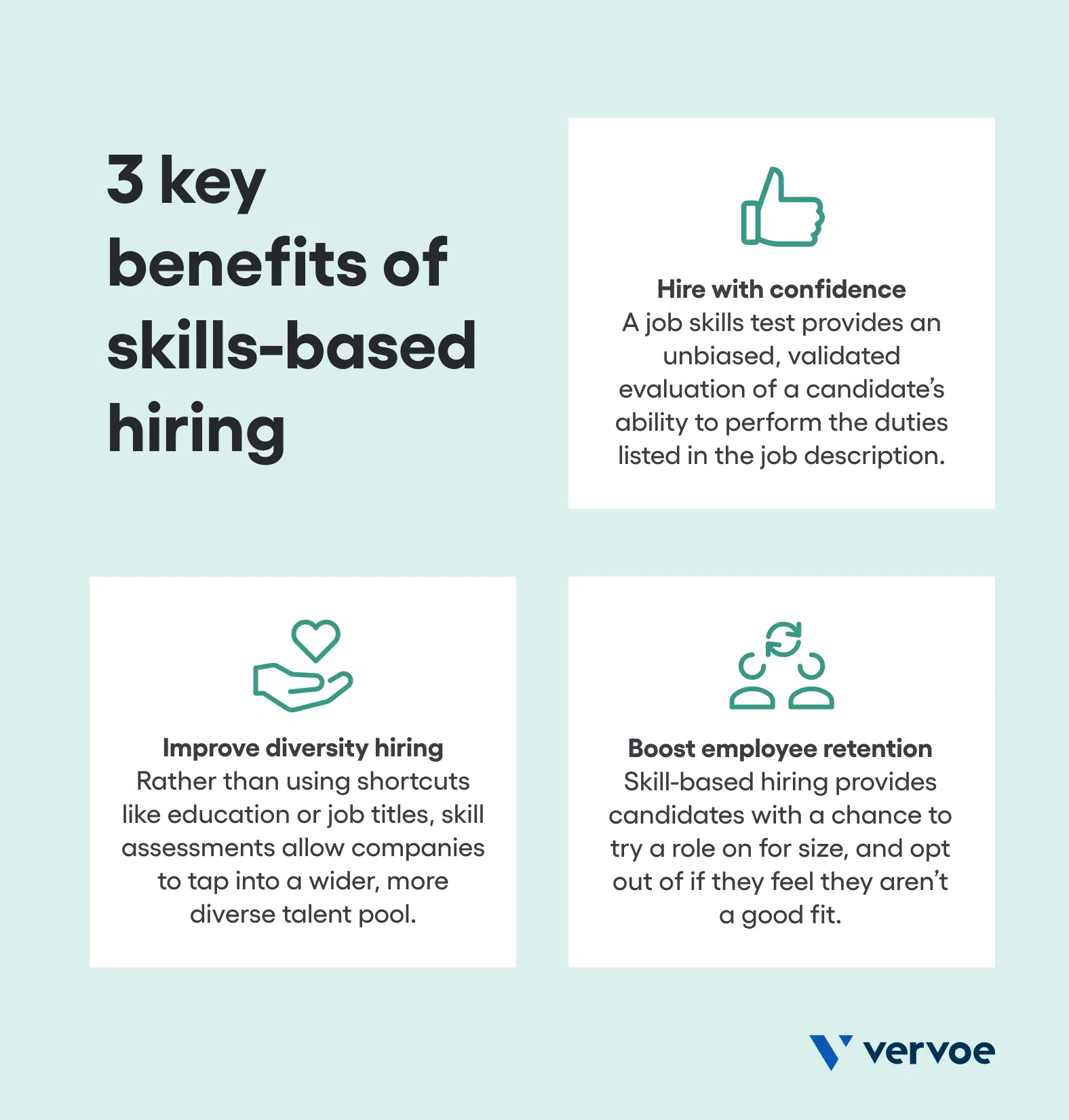If traditional hiring practices are increasingly proving to do more harm than good in recruitment, does this explain why skills-based hiring is on the rise?
In the post-pandemic hiring market, skills-based hiring is a new approach to solving old problems. Overall, global unemployment is projected to reach 208 million people in 2023, with an unemployment rate of 5.8%. Although there’s a massive pool of jobseekers, businesses are still somehow struggling to fill their open positions.
There are many reasons for this discrepancy, but traditional hiring practices that consider education and degrees as a predictor of success are proving to be a big obstacle for companies seeking to recruit top talent.
Instead of relying on outdated recruitment tools, skills-based hiring is emerging as the best alternative to close skill gaps, retain employees and reduce the chances of making a bad hire – but how exactly does it work?
What is skills-based hiring or a skills first approach?
If you’re unfamiliar with the philosophy, skills-based hiring is the practice of screening and hiring new employees based on the skills, capabilities, and talent they bring to the table — as opposed to their educational background or degree.
Skills-based hiring considers soft skills and hard skills to screen in candidates, rather than eliminating qualified applicants because they don’t have the right background on paper. The easiest way to implement skill-based hiring is through job skills testing, which is otherwise known as an employee skills assessment.
Some companies choose to integrate skill assessments early in the screening process to ensure that they’re spending time focusing on those candidates uniquely qualified to perform.
In contrast, others use it during the later stages of the recruitment funnel, particularly when trying to identify the best candidate from a shortlist of two or three applicants.

What makes skills-based recruitment different from other types?
In a typical hiring process, screening tools and tactics look for keywords on an application to verify if the candidate is suitable for the role. In theory, these screening practices seek to ensure the candidate is the “right fit”, using an applicant’s education or degree as a proxy for talent.
However, this approach to hiring can be misleading for a variety of reasons. Firstly, resumes are unreliable at best, since many candidates may inflate their experience or outright lie.
Secondly, a degree doesn’t necessarily tell you if a candidate is capable of performing well, as their qualifications may not reflect their actual abilities – but why is this discrepancy important?
Well, many recruiters look at a candidate’s resume, see the computer science degree, and assume the candidate has the skills required to do the job. At the other end of the spectrum, a recruiter will often dismiss an engineer’s self-taught coding skills because they don’t come with the right pedigree or certification.
Ultimately, failing to make hiring decisions based on skills risks recruiters missing out on great employees, just because a candidate doesn’t get the chance to prove what they can do. In addition, using skills as a metric to measure talent also encourages data driven decisions during the hiring process.
Why more companies are implementing skills first hiring processes
Hiring people based on skills allows recruiters to see if a candidate is truly equipped to do the job — helping them make the best hire the first time around. This is especially relevant in an era when many companies are facing a skills gap in their workforce.
As an example, the rising skills gap will see key industries like technology, media, and telecommunications fall short 4.3 million workers by 2030. In total, these shortages are predicted to cost this industry alone an eye-watering $449.7 billion in unrealized revenue.
Skill-based hiring allows companies to consider less “traditional” candidates: a former bartender, for instance, certainly has the customer service skills to work in a call center.
[Try Our Free Skills Gap Analysis Template]
It’s important to note that skills based hiring is a two pronged approach. Hard skills are specific technical skills and training, while soft skills relate to traits like leadership or communication.
In contrast, soft skills are highly valued across industries — but they can be difficult to screen for during the hiring process. Things like education, extracurricular activities, or leadership positions are often used by recruiters as a proxy for sought-after soft skills.
Unfortunately, these so-called predictors of soft skills can be discriminatory, preventing minorities and other diverse candidates from proving their abilities.
For groups that are often shut out of leadership positions and traditional institutions, it’s difficult to show soft skills in a two-dimensional application, like a cover letter or CV.

Why legislation is encouraging employee skills testing
Despite their benefits, in-demand soft skills are often assessed via personality tests, which have since been debunked as pseudoscience by Dr Sarah Gaither, an assistant professor of psychology and neuroscience at Duke University. Not only have these been proven as false indicators of success, but they may actually be illegal.
Bias tied to age, gender, race, religion, and more is pervasive in workplaces worldwide. In organizations, it’s all too easy to consciously or subconsciously include these biases in talent acquisition software, creating inequalities at every stage of the employment cycle.
What’s more, is that some forms of psychometric testing, such as personality tests, lack the proper validation required to be compliant with the U.S. Equal Employment Opportunity Commission (EEOC).
In addition, new legislation being introduced across the United States, in particular New York City, is soon to restrict employers from using recruitment screening tools powered by artificial intelligence.
As these changes would suggest, governments are increasingly moving towards legislation that encourages skills-based hiring to help combat systematic inequalities, and provide the same opportunities to people from all walks of life.
To make efficient and discretionary decision-making while still staying compliant, job simulations are one of the few skills assessment tools that will help companies to adhere to the relevant legislation while still having the tools to hire top talent.
3 key benefits of skills-based hiring
Ultimately, figuring out how to adopt skills-based hiring practices allows companies to achieve a number of high caliber goals in one simple philosophy.
Skill-based hiring helps lower recruiting costs by ensuring hiring managers bring on the right new employee the first time around — thereby avoiding the costs of a bad hire. It also enables companies to close skill gaps, improve retention, and increase productivity with people who are truly equipped to perform well.
By embracing employee skills testing as a key recruitment strategy, other noteworthy benefits of adopting this approach include the following.
Hire with confidence
Employee skills assessments are the easiest way to practice skill-based hiring, as a job skill test provides an unbiased, validated evaluation of a candidate’s ability to perform the duties listed in the job description. Using a series of questions in different formats, candidates are able to show how they would approach the role.
Depending on the nature of the role, questions can be immersive, such as a coding challenge or job simulation, or target soft skills: things like motivation, communication, and emotional intelligence. Alternatively, companies can combine both into a role specific job skills test as well.
Skill assessments level the playing field for all candidates. More so than resumes or job interviews, a skills test can assess the true potential of a new hire to go the distance with the company while giving all applicants an equal opportunity to showcase their talents.
More intense skill assessments, like job auditions, are another great way to predict job performance. Job auditions can take a few forms. Some organizations utilize a case study, while others will host a group interview or event. At Vervoe, we combine these formats into a unique skills testing tool called job simulations.
[Read More: Why Job Simulations Are The New, Predictive Way To Hire]
Improve diversity hiring
Research shows that skill-testing can help companies overcome unconscious bias and improve diversity hiring. Rather than using shortcuts like education or job titles, skill assessments allow companies to tap into a wider, more diverse talent pool.
While promoting the concept of skills-based hiring, Harvard Business Review told organizations to focus on the results that they would like to see, rather than the type of qualifications that they think could potentially deliver them.
“Start by rethinking your job descriptions. Highlighting the desired skills — the candidate’s ability to perform certain tasks — gets to the same results without creating an unnecessary barrier to entry, like a requirement for a four-year degree.”
By including candidates who have obtained their trade through alternative education methods, job skill testing can help companies reach their diversity hiring goals, which leads to a whole other host of benefits including increased innovation, productivity, and profitability.
Boost employee retention
Skill-based hiring aims to replicate the experience of working in the actual role the candidate will be hired for. For example, a marketer may be asked to present a strategy proposal. A UX designer might be asked to review a user flow within a product. A sales representative might be asked to write a cold outreach email.
For new hires, skill-based hiring provides the opportunity to try the role on for size. Candidates can then self-select out of the hiring process if they feel they aren’t a good fit. Inevitably, the candidate who is hired is not only a better fit for the role — they’re also excited to take on the day-to-day responsibilities.
More diverse candidates who are hired via skill-based hiring also tend to stay longer. According to LinkedIn, employees without a traditional four-year degree stay at companies 34% longer than those with such a degree, making them ideal choices for companies looking to boost retention.
In fact, the data shows that candidates also enjoy the opportunity to show their skills. Companies that use Vervoe’s assessments experience a 97% candidate completion rate, which is among the highest engagement rates in the industry.

A skills first approach makes life easier for recruiters
Many HR teams receive hundreds of resumes for a single open position. It’s nearly impossible to give every candidate’s application careful consideration, which leads many recruiters to simply select the candidates whose backgrounds seem most familiar or similar to theirs.
Thankfully, skills-based hiring helps to reduce the strain on recruiters, and help them to hire at scale. Vervoe uses machine learning to screen candidates in, not out, and our AI powered platform uses a unique, efficient multi-layered approach to match candidates with the preferences of the employer.
The algorithm allows HR teams to evaluate 10,000 candidates in the same time it takes for an individual recruiter to assess one. Recruiters receive a shortlist of top candidates who performed well related to the entire application pool — and no one is disqualified from continuing on in the process.
Can your company afford not to adopt employee skills testing?
Skill-based hiring doesn’t require a huge investment in time or resources — on the contrary, skill-testing can actually save recruiters money and effort. This approach is also an incredibly easy way to fill skill gaps in an extremely competitive hiring market, enabling candidates who may not have a traditional background to shine.
By considering factors other than education, skill-based hiring allows recruiting teams to find the right combination of hard and soft skills to fill every open position. To see people do the job before they get the job, book a demo with us today and let our experienced team run you through Vervoe’s full range of ready-made and tailored solutions.




















